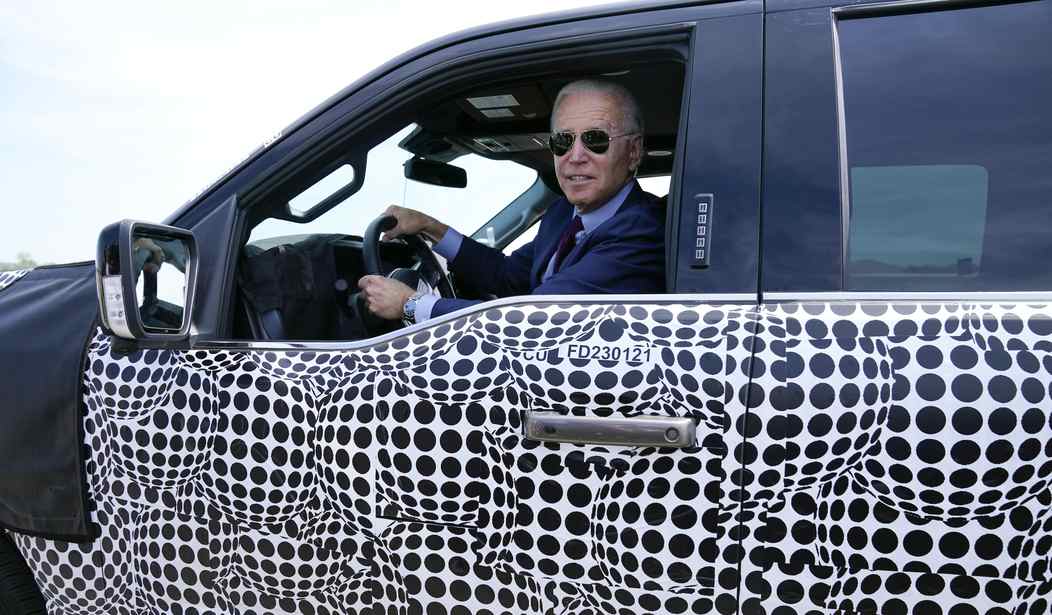How it started, and continues in Chicago:
Rep. Ro Khanna (D., Calif.) declared that the Green New Deal "will be the vision under President Harris" in his remarks at the Democratic National Convention. ...
"All the Green New Deal says is we're going to build new industry—new steel, new aluminum, new iron—new industry in America," said Khanna. "We're going to create new jobs in the places that were deindustrialized, and it's going to be good for the climate, and it's going to have less carbon footprint."
"That will be the vision under President Harris," he added. "No fossil fuel subsidies, a holding accountable of Big Oil, and a reindustrialization of this country that's going to make America lead as a climate champion in the world."
How it's actually going, in Detroit:
Ford Motor is canceling plans for a large electric sport-utility vehicle and expects to take $1.9 billion in related special charges and write-downs, as automakers continue adjusting their EV plans because of softer-than-expected demand.
The Dearborn, Mich., automaker this spring said it would delay plans for an electric three-row SUV by two years to a 2027 release date. On Wednesday, the company said it is scrapping the model altogether, citing tough pricing pressure as automakers resort to aggressive discounts to move their EVs.
The company also pushed back the launch of a new electric pickup truck by one year, until 2027.
Why? The demand has not materialized, in large part because consumers want range and reliability more than they want fashion and virtue-signaling. Ford has finally realized this, and it will cost them a fortune for a redirection away from the Green New Deal zero-fossil fuel agenda of the Left. CNN reports that Ford will instead look toward hybrids as their option for the climate-conscious consumer:
Ford on Wednesday acknowledged America’s electric vehicle market just isn’t what the automaker expected it to be: Customers are increasingly price-conscious and range-anxious. So, Ford is making big changes to its EV plans, focusing on hybrids and affordability. ...
“We learned a lot as the No. 2 U.S. electric vehicle brand about what customers want and value, and what it takes to match the best in the world with cost-efficient design, and we have built a plan that gives our customers maximum choice and plays to our strengths,” said Ford CEO Jim Farley in a statement.
In fact, Ford plans to shelve all of its plans for all-electric SUVs, opting for hybrids that allow consumers to use gasoline for reliability and range:
Ford ditched plans for its next lineup of all-electric SUVs, replacing them with hybrid models, which typically offer shorter battery range but longer overall range when combined with a gasoline engine.
This is a direct result of consumer demand, which has fallen steadily for all-electric vehicles of all types. In December, the Associated Press reported that hybrid sales had risen 76% year-on-year, while growth in sales of EVs year-on-year had stalled. Three months ago, MarketWatch found the same dynamic and noted that the popularity of the duel-fuel vehicles had automakers "scrambling"; IBD reported that GM and Ford had already begun recalculating EV strategy in April:
But quietly amid all the BEV hype, automakers' hybrid fleets took broad strides forward. Car buyers flinched at the challenges of EV ownership. And sales of hybrid cars, led by Toyota Motor (TM) and Honda Motor (HMC), ramped up to outpace those of the flashier electric vehicles.
Now carmakers are in overdrive to respond as analysts take a red pen to their BEV forecasts.
The revision in consumer preferences, and the expense of making and selling battery electric vehicles, has forced General Motors (GM) and Ford Motor (F) into an abrupt shift. Both legacy automakers are interrupting their highly publicized and expensive transitions to battery EVs to reemphasize hybrid cars.
This provides us an apt demonstration of the wisdom of markets. Politicians dictated the emphasis on EVs, not consumers, where EV demand was limited to niche market. EVs are generally suited best for urban-only environments, where charging stations can be more easily found and most driving trips are only a few miles. Outside of that environment, consumers need better range and more reliable connections to energy replenishment in whatever form the vehicle uses.
Hybrids make the most sense in all environments compared to EVs. Some hybrids can be charged directly, some only through a gasoline-powered internal combustion engine (ICE), but the batteries allow for short-trip driving without additional emissions ... as long as you don't count how the electricity gets generated for the battery charge, anyway. The hybrids allow for longer-range driving with access to the robust distribution of gas stations across the US, a critical infrastructure that we have spent a century developing.
From the consumer side, it's an obvious choice, even for those who are concerned with climate change or ICE emissions. Had consumers actually driven automaker strategies rather than politicians, Ford might not have wasted nearly $2 billion in investments on a mass-market plan for a niche-at-best product. Their shareholders will pay the price for that mistake, and so will the retirement funds and pensions that make up a significant portion of that shareholder base. And that means you and me, pals.
This is why we don't want politicians directing consumer innovation. It's almost as bad as politicians who think they can set prices better than consumers and suppliers in a free market.








Join the conversation as a VIP Member